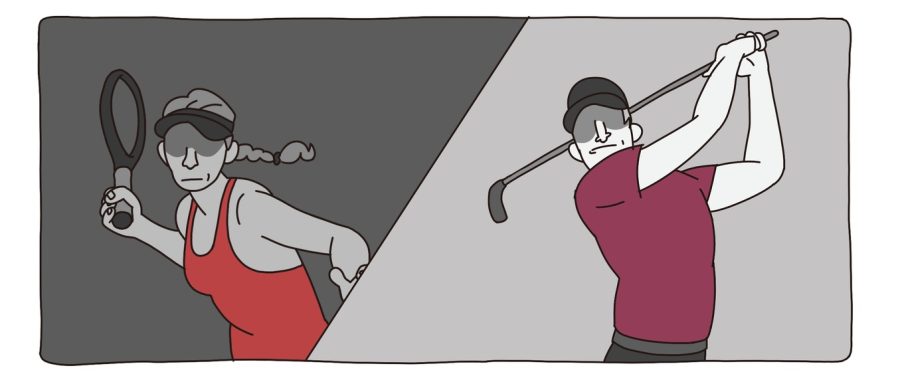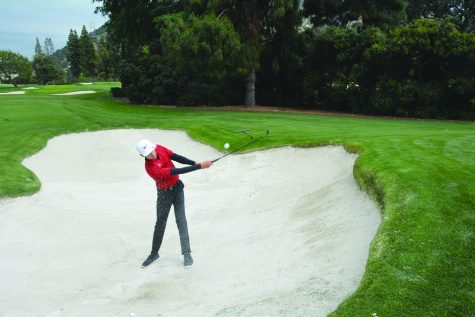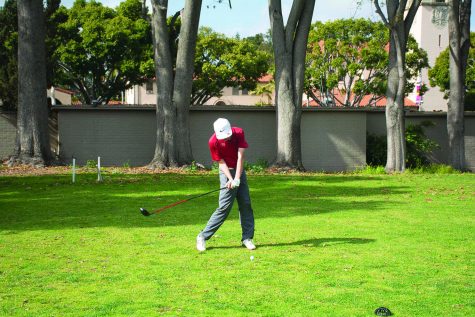Foul Play
September 28, 2022
Adi Shokeen ’24 sighed with relief as he won a grueling point, giving himself and his teammate a 40-30 advantage over their opponents in their doubles tennis match and inching closer to victory. But as he readied himself to deliver the finishing blow, the players on the other side of the court suddenly spoke up. They claimed that they were in the lead, not Shokeen. He said they were trying to cheat him of his victory.
Shokeen said cheating in cases like this is not unheard of. In fact, he said cheating is a common occurrence at the high school level in sports such as tennis and golf.
“[Cheating is] something that’s easy to pull off,” Shokeen said. “People are so competitive in high school sports that they are willing to do whatever it takes, even by means of cheating to try to win a point.”
Shokeen said that although the cheating he has witnessed is obvious and frustrating, it can be difficult to combat in high school sports competitions.
“It was obvious to everyone watching [the match] that we were up in that game, but they fought hard with no stopping in sight,” Shokeen said. “I would say the only way to prevent cheating is an umpire or some technology like at the professional level that helps to determine the calls, but that is not realistic.”
Boys Tennis Program Head Bo Hardt said the current honor system in place to prevent cheating is not enough, but that the solutions are expensive and often implausible.
“Tennis and golf are the only sports where the players operate as their own officials and with an honor system for all calls and scoring,” Hardt said. “Making unfair line calls is an issue at every level of tennis from kids under-10 tournaments to professional prize money events. The only way to prevent [cheating in these games] is to hire more officials or install electronic line calling, both of which will never happen because of the cost.”
Hardt said he believes that though it is difficult to regulate cheating, coaches and parents can take steps to stop their athletes.
“It’s on the parents and coaches to make sure athletes don’t cheat,” Hardt said. “I tell my athletes to never cheat in any area of life, and if we see an act of blatant cheating on court, they will be disqualified immediately. I tell my athletes to stand up for themselves when they are cheated, call the person out on it and then get a referee. It is very easy to cheat when there is no referee.”
Hardt said that many high school athletes have developed reputations for their cheating and that there are multiple common reasons for players to cheat.
“Cheating happens pretty often,” Hardt said. “There is a lot of pressure for some of these [athletes] to win [matches] for college aspirations, and there are notorious cheaters in junior and high school tennis.”
Shokeen agrees that cheating has become a pervasive issue in high school tennis. He said that it can often seriously change the results of a competition.
“I believe cheating is a very prevalent issue in tennis, especially in high school,” Shokeen said. “It has a very significant impact on the overall outcome of many games, since it can easily change the momentum of someone’s game and can lead to free points for the opposing team.”
Clarissa Brown ’24 said she has experienced cheating as a high school golfer. In a sport that is dependent on the honor of its athletes, Brown said players often begin to cheat as their scores rise.
“I’ve witnessed cheating before, in the form of lying about scores and bettering lies,” Brown said. “I would say that cheating tends to happen when people are approaching a high score during the round; however, there was one instance that was really new to me. I was playing in a school match, and I thought the round was going fine, but all of sudden one of the girls starts accusing another of cheating. She said the girl was putting down her ball mark in front of her ball. By doing this, the girl was making each one of her putts shorter.”
Brown said she did not expect to experience such flagrant methods of cheating.
“This situation [shocked me],” Brown said. “I’ve never seen someone do something as risky as make the ball closer to the cup.”
Brown said that although it is greatly problematic to the fairness of the sport, it is difficult to regulate dishonesty.
She said that although golfers are often assertive in calling out cheating, the current honor system in golf is unreliable.
“I think cheating in golf is a big issue,” Brown said. “The only solution to cheating at the high school level is the honor system, which often tends to prove ineffective in my experience. I’ve noticed that golfers will typically say something because the cheating could affect them.”


































